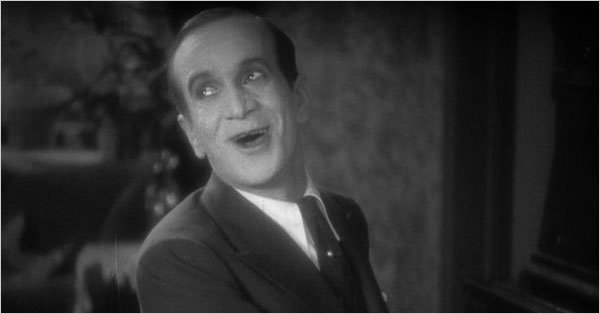|
Um...unrated by default. Let's say this right now. If you show this to a young audience, you have a lot of explaining to do.
DIRECTOR: Alan Crosland Do you know how hard it was to find a high res still from The Jazz Singer that wasn't a picture in blackface? I'm sure that Villa Madonna Academy doesn't want an advertising tool brandishing Al Jolson in blackface. But maybe I'm just contributing to the problem. After all, it kind of has the association with blackface. Am I whitewashing history by putting that photo up there? I don't know, but I have a feeling that I'm going to be discussing that pretty heavily in this critique. Most of the movies in our curriculum I have seen previously. It may have been a while, but I've seen most of them. Believe it or not, I've ducked the outright racist ones in the group. It was this and Birth of a Nation that completely flew under my radar, but that was actually by choice. So I had to sit down and full on screen these movies before preparing them for my class. I taught one year as a social studies teacher previously and that was World History. Having to deal with the ugly side of American sociology is new to me outside of literature. I thought I was prepped for racism once I had gotten through Birth of a Nation. Let's establish this right now, Birth of a Nation, hands-down, no-contest will always win for "Most Racist Piece of Historical Garbage" I'll ever watch, but does this mean that I should be forgiving of things that are far less demoralizing. The big thing is that I thought I was prepped. Most of the movie is actually fairly touching. There's a weird sense of irony that pops up looking back at history. The theme of the movie involves the respect for culture. Jakie Rabinowitz abandons his family legacy of being a Jewish cantor to pursue his dreams of becoming a Broadway star. It crushes his father's heart and he disowns him. When it comes to his father's final wish, Jakie must decide between embracing his Jewish heritage or finally getting the dream he has been working towards. Mind you, that dream involves blackface and singing "Mammy". *sigh* I've been through this with Holiday Inn and The Marx Brothers! Can a movie be good and still include such awful moments? I mean, I have to show this movie to my class! It's the first talkie! (More on that later.) There seems to be value. I mean, The Jazz Singer established a trope of abandoning culture for success. The movie is actually fairly touching at times. And then he had to blackface the crap out of this movie. I actually thought I could handle it. I mean, I knew it was coming. The still of Jolson down on one knee is part of cinematic history. I thought that the movie couldn't be that bad. But then it showed up and I instantly got soured on the whole thing. The parts of the movie I enjoyed didn't hold up to this moment. It's odd trying to appreciate art but also involve one's own sensibilities and cultural norms. Anyway, I suppose I should move on. I hinted at the fact that his movie, like Birth of a Nation, survives history because of the innovation that went into this movie. After watching Singing in the Rain and reading Chaplin's thoughts on the novelty of sound, I had to wonder why they thought that. And now it all makes sense. The Jazz Singer treats it as a novelty as much as they thought. Very little of this movie is actually a talkie. This really is a silent movie with a couple of moments of singing / speech. Much of the talking is actually pretty poorly done, not matching the mouth moments remotely. The only one who really gets it is Jolson himself, who is clearly being recorded in the moment. The other actors are just pantomiming talking and it really pulls the audience out of the moment. The movie is very typical of Hollywood's "cake-and-eat-it-too" philosophy. The plot presents two very exclusive choices that are instantly undone in the attitude of feelgoodery. That always bums me out. Watching old Hollywood is great, but the lack of risk taking in many of these studio movies just feels so safe. There could have been a great finale, but the movie kind of drops it. I also wonder why the play didn't have an understudy. The stakes were very dramatic, but I guess that's what makes a movie larger than life.
0 Comments
Leave a Reply. |
Film is great. It can challenge us. It can entertain us. It can puzzle us. It can awaken us.
AuthorMr. H has watched an upsetting amount of movies. They bring him a level of joy that few things have achieved. Archives
July 2024
Categories |

 RSS Feed
RSS Feed